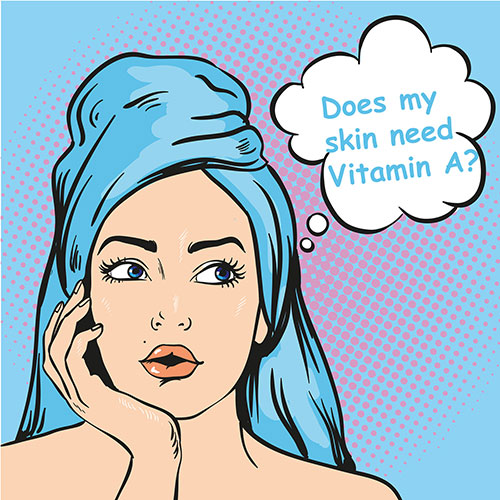Vitamin A for Awesome Skin
Posted by Dana Ramos, author of the best-selling book: The Skin Regime; Boot Camp for Beautiful Skin on Mar 15, 2018
We all know the importance of having a good diet and getting necessary vitamins and minerals—from vitamin A to the mineral Zinc—but we’d be eating all day long if we tried to get the “recommended dietary allowances” for vitamins and minerals naturally! And too many of us take a boatload of supplements trying to chase some ideal, which keeps changing; the “recommendations” and “studies” often conflict and it seems every other month there is some new study saying “take this, don’t take that, this is necessary, no it’s not…” Additionally, we’ve got all kinds of pseudo-scientific supplements which are heavily marketed to us, claiming to treat everything from baldness to insomnia to matters of sexual performance—and most of those are downright shams.
Stress not! If you are eating a well-balanced diet and popping a daily multi-vitamin with minerals to hedge your bets, you more than likely doing just great.
First of all, there are two types of vitamin A; one type comes from animals, which are called retinoids, and the other from plants, which are beta-carotenes. Eating a balanced diet with fruits, vegetables and whole grains normally supplies us with the vitamin A our bodies need, but in some cases, it is recommended to take supplements—a knowledgeable doctor will be able to help you decide if you are deficient. And like most vitamins or other substances—too much vitamin A can be harmful and sometimes even a small amount of can conflict with medications you are taking, so before considering taking any oral supplements of vitamin A, you must consult with your doctor or pharmacist.
Good sources of retinoid vitamin A include eggs and whole milk, and for beta-carotene vitamin A—carrots, spinach and apricots.
This post is not about ingesting vitamin A, but about what it can do for you by applying vitamin A-based preparations if you have specific skin issues. It can, in many many cases, make a huge difference and topical and oral retinoids have become common treatments for acne, wrinkles and other skin problems and have a track record of over 40 years of great success.
Via medical supervision, a vitamin A derivative prescription of isotretinoin (under the brand name Accutane, for instance) has been a Godsend for people with severe acne. Taken for a few months, it can permanently reduce—or completely cure—cystic and other types of chronic acne.
Applied topically, vitamin A retinoid derivatives have long been used to control acne, reduce sun damage and control wrinkling of the skin. For decades, prescriptions for tretinoin (under the brand name Retin A, for instance), has been used with great results. After several weeks of use, tretinoin can create smoother skin, less discoloration, smaller pores, less acne—and reduce fine lines.
Another vitamin-A based topical product that you do NOT need a prescription for is RETINOL. This product is so similar to tretinoin that a great number of people—myself included—has converted to using retinol preparations; indeed I find it less irritating and just as effective in all ways. Even many dermatologists have jumped on the retinol bandwagon.
If you are new to using any retinoid creams or serums, start with the lowest percentage, such as Platinum’s Retinol Molecular Serum 10, and gradually work your way to a higher percentage. After a few days of use, you may experience some peeling and flaking—this is actually a very good thing. Your skin could also become irritated at the beginning—that is not such a good thing and if irritation happens, stop using for a few days and then continue as per instructions (always follow the directions and use only once a day and only at night because sunlight can cause an adverse reaction). Your skin will adjust in 6 – 12 weeks of use and you might then wish to increase the strength; or if you are happy with your results, continue with the lower percentage formulations. Slowly, over the course of a few months, you will notice more and more improvements in your skin.
Want to give it a try? Start with a trial size by clicking here.
If you do have dry or irritated skin, or rosacea, you can calm it down and moisturize with B Complex Vitamin B Cream— good for all skin types.
If you have more questions or concerns, you can always contact Platinum Skincare and even get a free consultation—just click here to get started!




